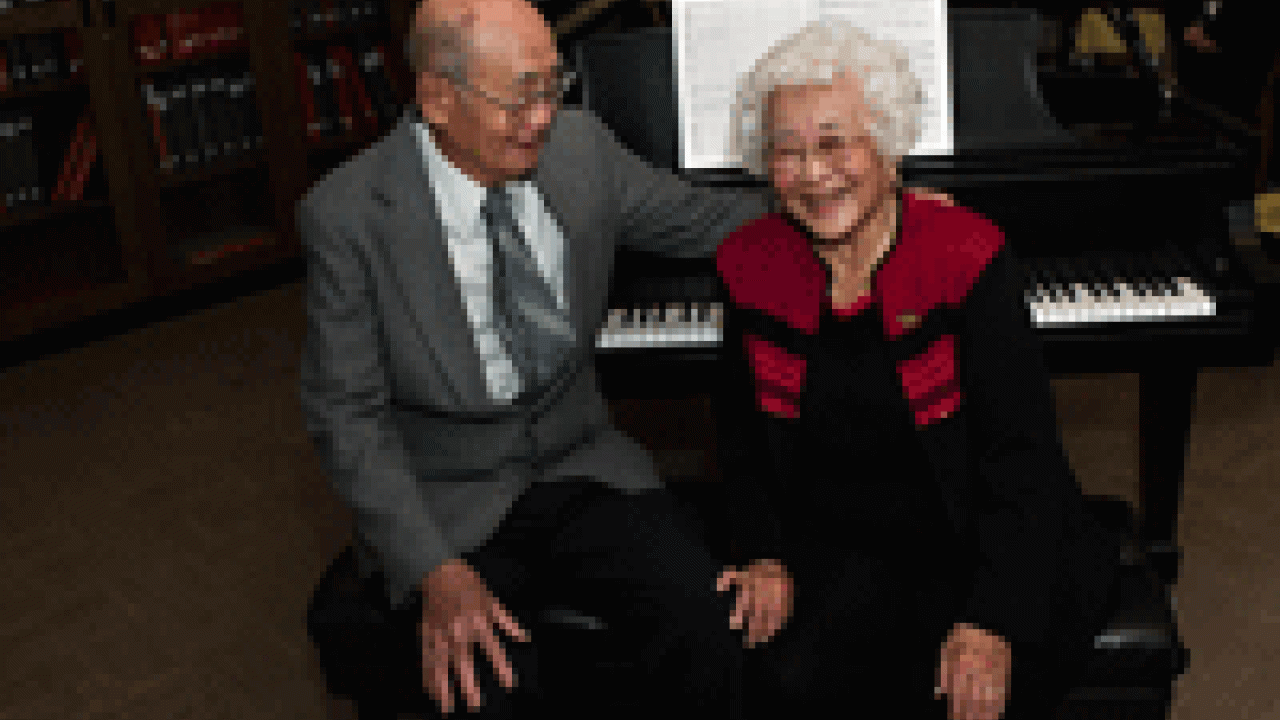A Davis family with a long history of serving UC Davis and supporting music, science, Japanese-American civil rights and other humanitarian causes has donated $1 million to the Department of Music to help build a major new music recital hall.
The gift, the largest in the music department's history, will support construction of a modern, 400-seat performing arts facility. Due to open in 2011, the new recital hall near the corner of First and A streets is expected to become one of the most active concert venues in the Sacramento region.
The gift from Grace and Grant Noda and their adult daughters, Kathy Miura and Tanya Yan, will be announced Sunday at the annual performance of the combined UC Davis Symphony Orchestra, Chorus and Alumni Chorus. Grant Noda worked for the UC Davis Department of Botany (now Department of Plant Biology) for 27 years, before retiring in 1985.
In appreciation to the Nodas for their family gift, the campus plans to name a courtyard in their honor on the west side of the new recital hall. The Noda Family Courtyard will be an outdoor site for lectures, informal performances and artist receptions.
"We are tremendously grateful to the Noda family," said Jessie Ann Owens, dean of the Division of Humanities, Arts and Cultural Studies. "In musical performances, space is a true partner in the performance. It is impossible to make music of the highest quality without having a performance space with good acoustics. What a well-equipped lab is to science, a superb recital hall is to music. We have excellent students: They need a good space in order to reach their potential."
The $21.6 million project will be financed by a combination of public and private support: $16.1 million from a bond issue proposed for the November 2008 ballot and $5.5 million in private contributions. With the Noda's gift and others, $4.4 million in private funding remains to be raised.
The recital hall is expected to accommodate more than 100 concerts annually, including such music department presentations as chamber festivals, the free noon concert series and performances by student and professional resident ensembles and artists in residence. It will also provide additional programming options for the Robert and Margrit Mondavi Center for the Performing Arts.
Badly needed teaching space for the Department of Music will be included in the new building. For example, enrollment in Music 10, a large basic survey course that will be taught in the new recital hall, has grown from 50 to 750 since 1966, when the present Music Building was constructed. The number of undergraduate music majors has increased more than 13-fold during the same period, from 11 to 150, and the number of faculty has ballooned from six to 39.
'Musical genius'
Music has been central to the Nodas' lives. Grace studied piano and cello during her childhood in Orange County. With her father, who served as secretary of the Farmers Association of Norwalk and principal of the local Japanese language school, she went to Los Angeles to hear performances by Rachmaninoff and other world-class musicians. Her youngest sister, Alice, referred to as a "musical genius" in a 1935 Los Angeles Times story and photo, played piano for Polish Prime Minister Ignacy Paderewski and U.S. Supreme Court Justice Abe Fortas. Grace's other two sisters also learned instruments as children. Grant's father, a farmer, often struggled to feed nine children, but the family had a piano at home.
During World War II, when both families were interned at relocation camps in Arkansas and Colorado, music was a bright spot. Grace taught rote singing to interned children (no instruments or sheet music were available). A piano was brought to camp at one point, so that her sister Alice could perform for detainees.
Grant and Grace met after the war when he was a research scientist at UC Berkeley and she was an elementary school teacher in Richmond. The couple moved to Davis in 1958 when Grant accepted a position in the UC Davis Department of Botany where he managed the department's laboratory by day and studied real estate at night, After his 1985 retirement from the university, Grant devoted himself full time to the real estate business he had been building for more than two decades.
The family has supported creation of a mural at Earlham College in Richmond, Ind. — Grant's alma mater — that memorializes the Japanese American internment experience. The Nodas have also given to an opera program for young people in San Francisco, donated to the Hurricane Katrina relief effort, contributed to local Democratic candidates and, before their gift to the recital hall, contributed more than $100,000 to UC Davis over the years in support of the arts, ethical studies and the sciences.
Although the Nodas make philanthropic decisions together, the latest major gift to the music department was especially important to Grace.
"Music has been my life," she said, "so I wanted to leave something when I am gone."
Tanya says her mother sees "something very generous about music: rich or poor, everyone has access to it. It transcends race, social status. It is apolitical. It has been a constant in my mother's life, through everything."
Media Resources
Clifton B. Parker, Dateline, (530) 752-1932, cparker@ucdavis.edu
